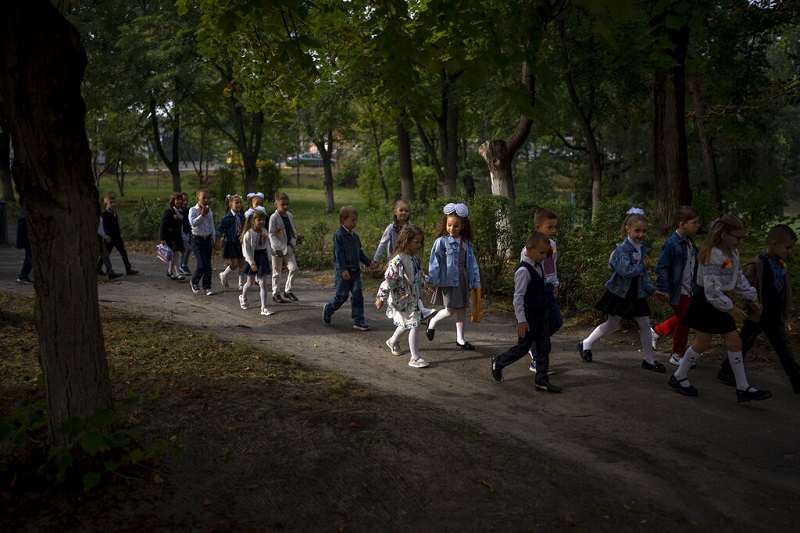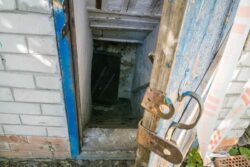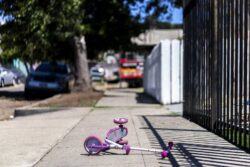It’s back to school in Ukraine — but far from normal

Students walk together entering in their class during their first day of school at a public school in Irpin, Ukraine, Thursday, Sept. 1, 2022.
11:22 JST, September 2, 2022
MYKHAILO-KOTSYUBYNSKE, Ukraine (AP) — It was the first day of school in Ukraine on Thursday but children weren’t sharing memories of fun vacations with their families. Their stories were of surviving war. For many, their last day of school was the day before the Feb. 24 Russian invasion of their country.
At least 379 children have been killed since the war began, while the whereabouts of 223 others are unknown, according to Ukraine’s General Prosecutors office. Another 7,013 children were among Ukrainians forcibly transferred to Russia from Russian-occupied areas.
Six months of war damaged 2,400 schools across the country, including 269 that were completely destroyed, officials said.
Civilian areas and schools continue to be hit, and children keep being killed. But after the first months of shock, 51% of schools in Ukraine, despite the risk, are reopening to in-person education, with an option to study online if the parents prefer.
But safety remains the priority. At schools that don’t have quick access to shelters or are located close to the borders with Belarus and Russia, or near active military zones, children will only study online.
That’s the case for the seventh graders in Mykhailo-Kotsyubynske, just 20 miles (35 kilometers) from the Belarus border, who gathered at their badly damaged school this week to pick up textbooks for studying online.
“We haven’t seen each other for such a long time. You all have grown so much,” said their teacher, Olena Serdiuk, standing in a corner of the classroom, where windows were covered with thick black polythene instead of glass.
Oleksii Lytvyn, 13, remembers very well the day Russian missiles hit the school twice. It was March 4, and he was in the school’s bomb shelter with his family and dozens of other people.
Just minutes before the blast, he had been playing with a friend. After the loud explosion, the walls began shaking and he couldn’t see anything but a huge cloud of debris. One person was killed, a woman who worked at the school.
“We were sleeping in the corridor, and there was a corpse of a dead person behind the wall,” Oleksii recalled. His family stayed one more night before fleeing town, though they have since returned for the start of the school year.
Oleksii’s classmates shared similar stories about that day and the monthlong Russian occupation that followed.
“When I’m at school, I think about the person who died in the debris. I feel deeply sorry for her,” 12-year-old Mykola Kravchenko said.
Their school is still badly damaged. Debris fills the second floor, and the roof and heating system need to be repaired — money the school doesn’t have.
Even though they will be studying online, the students had to undergo security training. Serdiuk told the class to follow her to the same bomb shelter where many survived the blast in March.
In the dimly lit shelter were water supplies and long benches with labeled seats for each classroom. When the children took the seats assigned to their class, Serdiuk told them they had to go there whenever they heard a siren.
She said many parents tell her their children are begging to return to school, but for now that isn’t allowed because of the danger of being so close to the Belarus border.
“It does become kind of the new normal for children,” UNICEF Executive Director Catherine M. Russell, told The Associated Press. “That’s not the way children should go through life, thinking that they are going to get attacked at any moment.”
Schools in the Kyiv and Lviv regions were among those welcoming students back to classrooms Thursday, including more than 7,300 displaced students forced to flee their hometowns.
In a neighborhood of Irpin, north of Kyiv, still bearing the scars of war, with destroyed homes and shrapnel-marked fences and walls, first-grade children lined up excitedly for their first day of classes in their newly renovated school.
Hit by a missile during the early days of the war, Irpin School Number 17 was rebuilt with the help of UNICEF, the faint smell of fresh paint still lingering as the students walked into their classrooms hand-in-hand.
“This year is different to the others. We are in a war situation,” said first grade teacher Olga Malyovana. “We were really worried about the children and their safety, but we fixed all the facilities, we have a shelter.”
First order of the day was an evacuation drill, with a fire alarm going off and all the children lining up to head to the basement bomb shelter or designated safe — and windowless — areas in the corridors.
Oleksandra Urban came to drop off her 6-year-old daughter, Veronika, the normal trepidation of the first day of school mingling with worry about classes during wartime, even though strikes on Kyiv and nearby areas are now rare.
She’s explained to Veronica how to evacuate to a bomb shelter, she said. “She is worried only when I am worried. That’s why I am trying to be calm.”
Urban and her husband discussed distance learning for Veronika, but decided physical presence in school was essential, both for contact with other children and with the teacher.
“I believe that school will save the life of my kid,” Urban said.
Murat Sahin, UNICEF representative in Ukraine, agreed.
“Two years of Covid and … six months of war, it is having disastrous impact on children’s growth and learning and mental health,” Sahin said. “So we need to bring that normalcy.”
In Kramatorsk in the Donetsk region, there’s no hope for schools to open their doors — the city has been under constant shelling since the beginning of the war.
In one school, the first-grade classroom was all ready: tables, chairs, a clean blackboard, the alphabet and numbers hanging on the wall. The only thing missing was the students.
Seated in the empty room was Oleksandr Novikov, the school’s director for 12 years and a teacher for more than 20.
“It is very depressing, it is very unpleasant to feel that you come to an empty school,” he said. “There will be no children laughing at school.”
While Ukraine tries to defend itself from the Russian invasion, Novikov dreams of better times.
“I would like a real first bell, a real meeting with children and teachers, a real lesson, when eyes look at you with inspiration, trust and a desire to hear something new, to learn something new.”
“This is what I would like to see,” he said.







